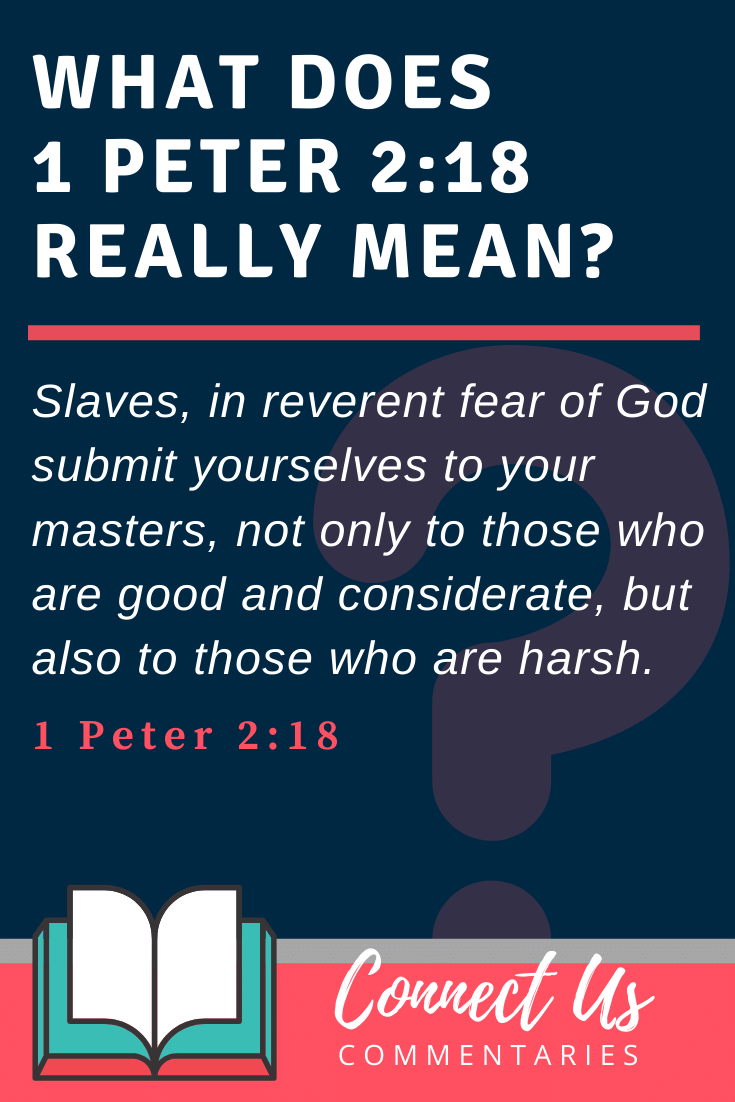1 Peter 2:18
“Slaves, in reverent fear of God submit yourselves to your masters, not only to those who are good and considerate, but also to those who are harsh.”
Explanation and Commentary of 1 Peter 2:18
“It is for freedom that Christ has set us free. Stand firm, then, and do not let yourselves be burdened again by a yoke of slavery” (Gal 5:1). So said Paul in his letter. But both Paul and Peter addressed the situation of slaves and masters, not as abolitionists, but in a manner concerning the inevitability of the social institution for the present time. Christianity would prove to be the leavening that eventually and thoroughly undermined the institution, but this took a great deal of time and was not the immediate concern of any of the writers of the New Testament, nor of Jesus.
Peter’s point here is that, though they are free, and though the Gospel has proven the equal dignity of each and every human (Gal 3:28), as they still find themselves in unjust positions, such as the one Christ found himself in at his trial, that they, because of their relative freedom, should completely submit to their earthly masters and all other earthly authority as much as they are able. Though slavery in the Roman world was not as it was in early America, it was still to be a nonperson with no rights and no justice. But that was just a construct, and temporarily a necessary one. The question for the slave was always the same as the question for all of us: In light of the Gospel, and in light of our current life situation, How shall we then live? Peter draws on the principle that ultimate freedom is accepting, for a time, the injustice that happens to be inescapable in this life in imitation of Christ, who clearly showed us how to suffer injustice for the sake of the “joy set before him” (Heb 12:2).
Breaking Down the Key Parts of 1 Peter 2:18
#1 “Slaves,”
Slavery was a crucial part of the Roman world’s social systems. Slaves were a working class of people who were counted as property with no rights and no justice save that of the master’s justice. Some slaves enjoyed better conditions than others, and some were even made leaders in churches where their masters were members. God created all men and women as equals, a fact underlined by the Gospel, but equality in social systems would take many hundreds of years for broken and fallen man to achieve, and in some ways is yet to come.
#2 “in reverent fear of God,”
The remedy for the fear of man for anyone, especially slaves with no rights, is the reverent fear of God. To fear God is to have reverence for him, to believe that God is capable of any action he desires to do, and that he is holy to the extreme, his justice unassailable. The understated way to say this is that one should take our Father in heaven seriously.
#3 “submit yourselves to your masters,”
The command implies a surprising element of freedom. To ask the slave to make his own choice to submit himself implies an understanding that the slave does in fact own charge of himself, his will. No error of human social constructs or contracts can nullify the fact of what God has ordained: humans are free, and stand alone as individuals before God with a will all their own, for the sake of functioning as divine image-bearers who are created and called to produce, multiply, and subdue the earth.
#4 “not only to those who are good and considerate,”
Hopefully Christians who were of the class of citizens with household slaves could understand this well enough that, even if they did not have the consciousness to free their slaves, at least would, in obedience to God, be “good and considerate” towards them.
#5 “but also to those who are harsh.”
Many, if not most, Christian slaves may have found themselves under the unjust authority of harsh masters. Peter and Paul (Eph 6:5) both saw this as an opportunity for the Way to shine as Christians had a major opportunity to concretize the message of the cross by bearing up under suffering when it was inevitable. Paul said that if slaves can buy their freedom, they should, but assuming it was not possible, his instruction, like Peter’s, centered on how to conduct oneself in the situation within which one is constrained.
Bible Study on 1 Peter 2:18
Expert Overview of 1 Peter
Biblical Translations of 1 Peter 2:18
NIV
Slaves, in reverent fear of God submit yourselves to your masters, not only to those who are good and considerate, but also to those who are harsh.
NLT
You who are slaves must submit to your masters with all respect. Do what they tell you—not only if they are kind and reasonable, but even if they are cruel.
ESV
Servants, be subject to your masters with all respect, not only to the good and gentle but also to the unjust.
KJV
Servants, be subject to your masters with all fear; not only to the good and gentle, but also to the froward.
NKJV
Servants, be submissive to your masters with all fear, not only to the good and gentle, but also to the harsh.

Natalie Regoli is a child of God, devoted wife, and mother of two boys. She has a Master's Degree in Law from The University of Texas. Natalie has been published in several national journals and has been practicing law for 18 years.